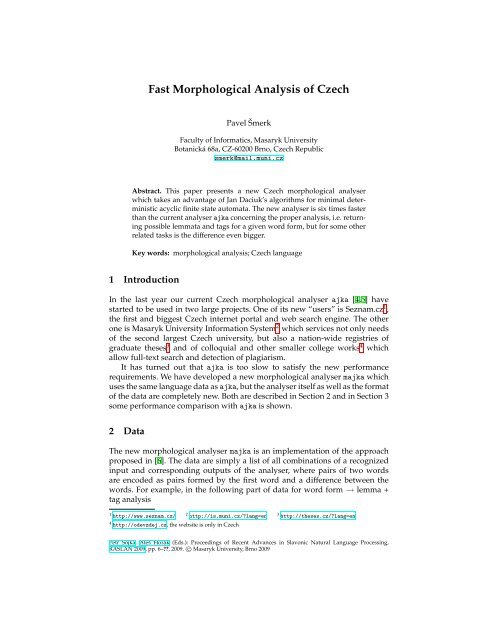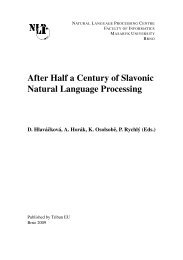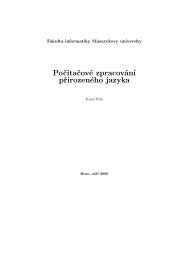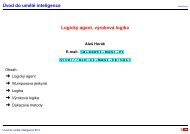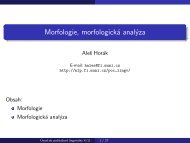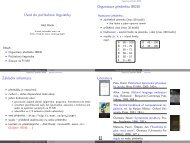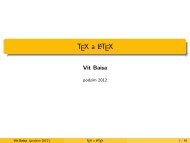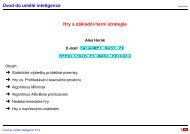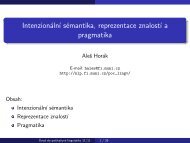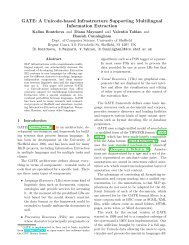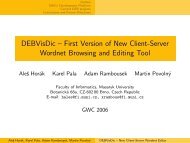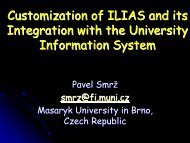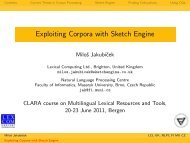Fast Morphological Analysis of Czech
Fast Morphological Analysis of Czech
Fast Morphological Analysis of Czech
You also want an ePaper? Increase the reach of your titles
YUMPU automatically turns print PDFs into web optimized ePapers that Google loves.
<strong>Fast</strong> <strong>Morphological</strong> <strong>Analysis</strong> <strong>of</strong> <strong>Czech</strong><br />
Pavel Šmerk<br />
Faculty <strong>of</strong> Informatics, Masaryk University<br />
Botanická 68a, CZ-60200 Brno, <strong>Czech</strong> Republic<br />
smerk@mail.muni.cz<br />
Abstract. This paper presents a new <strong>Czech</strong> morphological analyser<br />
which takes an advantage <strong>of</strong> Jan Daciuk’s algorithms for minimal deterministic<br />
acyclic finite state automata. The new analyser is six times faster<br />
than the current analyser ajka concerning the proper analysis, i.e. returning<br />
possible lemmata and tags for a given word form, but for some other<br />
related tasks is the difference even bigger.<br />
Key words: morphological analysis; <strong>Czech</strong> language<br />
1 Introduction<br />
In the last year our current <strong>Czech</strong> morphological analyser ajka [4,5] have<br />
started to be used in two large projects. One <strong>of</strong> its new “users” is Seznam.cz 1 ,<br />
the first and biggest <strong>Czech</strong> internet portal and web search engine. The other<br />
one is Masaryk University Information System 2 which services not only needs<br />
<strong>of</strong> the second largest <strong>Czech</strong> university, but also a nation-wide registries <strong>of</strong><br />
graduate theses 3 and <strong>of</strong> colloquial and other smaller college works 4 which<br />
allow full-text search and detection <strong>of</strong> plagiarism.<br />
It has turned out that ajka is too slow to satisfy the new performance<br />
requirements. We have developed a new morphological analyser majka which<br />
uses the same language data as ajka, but the analyser itself as well as the format<br />
<strong>of</strong> the data are completely new. Both are described in Section 2 and in Section 3<br />
some performance comparison with ajka is shown.<br />
2 Data<br />
The new morphological analyser majka is an implementation <strong>of</strong> the approach<br />
proposed in [6]. The data are simply a list <strong>of</strong> all combinations <strong>of</strong> a recognized<br />
input and corresponding outputs <strong>of</strong> the analyser, where pairs <strong>of</strong> two words<br />
are encoded as pairs formed by the first word and a difference between the<br />
words. For example, in the following part <strong>of</strong> data for word form → lemma +<br />
tag analysis<br />
1 http://www.seznam.cz/ 2 http://is.muni.cz/?lang=en 3 http://theses.cz/?lang=en<br />
4 http://odevzdej.cz, the website is only in <strong>Czech</strong><br />
Petr Sojka, Aleš Horák (Eds.): Proceedings <strong>of</strong> Recent Advances in Slavonic Natural Language Processing,<br />
RASLAN 2009, pp. 6–??, 2009. c○ Masaryk University, Brno 2009
klouček:A,k1gMnSc1<br />
kloučka:Cek,k1gMnSc2<br />
kloučka:Cek,k1gMnSc4<br />
<strong>Fast</strong> <strong>Morphological</strong> <strong>Analysis</strong> <strong>of</strong> <strong>Czech</strong> 7<br />
the colon is a delimiter between the possible inputs and corresponding outputs<br />
and the letters A and C as the first and the third letters <strong>of</strong> the alphabet mean<br />
“to get the lemma delete n-1 (i.e. 0 or 2, respectively) last characters from<br />
the word form and then attach the rest <strong>of</strong> the string (i.e. empty string or ek,<br />
respectively)”. Then the word form klouček will be analyzed as a lemma klouček<br />
with a morphological tag k1gMnSc1 5 and a word form kloučka as a lemma<br />
klouček with morphological tags k1gMnSc2 and k1gMnSc4 6 .<br />
Such a list is then represented as a minimal deterministic acyclic finite state<br />
automaton using Jan Daciuk’s algorithms for incremental building <strong>of</strong> minimal<br />
DAFSAs [1]. This representation dramatically reduces the size <strong>of</strong> the data (some<br />
particular figures can be seen later in Table 2). The lookup is then very simple: if<br />
the analysed string concatenated with the delimiter is found in the automaton,<br />
then each possible remaining path to a final state <strong>of</strong> the automaton encodes one<br />
<strong>of</strong> possible analyses.<br />
It means that there is no “real” analysis as a sophisticated algorithm above<br />
some grammar model or a system <strong>of</strong> paradigms, but whole analysis is only a<br />
simple — and therefore fast — dictionary search.<br />
3 Performance Comparison<br />
Results <strong>of</strong> a performance comparison <strong>of</strong> the analysers ajka and majka are<br />
presented in the Table 1. The comparison was done on the first one million<br />
words from the SYN2000 corpus [7] which is a part <strong>of</strong> the <strong>Czech</strong> National<br />
Corpus 7 .<br />
Table 1. Results <strong>of</strong> comparison <strong>of</strong> the old analyser ajka and the new analyser<br />
majka<br />
size <strong>of</strong> data in MB time in seconds<br />
ajka majka ajka majka ratio<br />
morphological analysis<br />
4.4 18.22 2.88 6.3x<br />
lemmatisation<br />
all word forms<br />
3.1<br />
4.0<br />
6.1<br />
16.76<br />
55.33<br />
1.57<br />
8.42<br />
10.7x<br />
6.6x<br />
restoration <strong>of</strong> diacritics 3.3 8698.80 1.61 5403x<br />
The measured time is a “wall clock” time as was reported by a unix<br />
command time. All times are averages <strong>of</strong> three runs. Outputs <strong>of</strong> the analysers<br />
were allways redirected to /dev/null to measure only a CPU time and not<br />
waits for a hard disk etc.<br />
5 little boy in nominative form<br />
7 http://www.korpus.cz/english/<br />
6 little boy in genitive and accusative form
8 Pavel Šmerk<br />
It should be noted that, in the contrary <strong>of</strong> what a reader might expect,<br />
the extreme difference in the speed <strong>of</strong> the diacritics restoration is the least<br />
surprising for us, because this task is implemented very poorly in ajka.<br />
The outputs <strong>of</strong> the old and new analyser are not quite identical: there are<br />
still some minor differences or even bugs on either side (mainly in an analysis<br />
<strong>of</strong> compound words), which will be addressed in the near future, but none <strong>of</strong><br />
these differences can notably affect the overall performance.<br />
As is obvious from the previous section, the new analyser majka has to have<br />
separate dictionary for each task — unlike ajka, which has only one common<br />
data, and even smaller. It is a kind <strong>of</strong> a tax for the speedup, but this several<br />
megabytes difference is not a problem for present-day computers.<br />
The Table 2 shows the extent <strong>of</strong> the compression <strong>of</strong> dictionaries. For other<br />
languages, Kowaltowski [3] reports 0.25 byte per one word-tag-lemma entry for<br />
Brazilian Portuguese and Daciuk [1] reports less then 0.15 byte per one wordlemma-tag<br />
entry for German and ca. 30 times better compression rate compared<br />
to gzip on that data. The presented results show similar or better compression<br />
for the <strong>Czech</strong> data as well<br />
Table 2. Statistical information on the data files <strong>of</strong> the new analyser majka<br />
type <strong>of</strong> dictionary # <strong>of</strong> entries size <strong>of</strong> entries size <strong>of</strong> dict. bytes/entry<br />
word (diacritics restor.) 13,609,590 186,154,068 3,263,374 0.240<br />
word → lemma 14,101,767 239,578,702 4,042,839 0.287<br />
word → lemma, tag 80,303,929 2,477,786,062 4,353,616 0.054<br />
word → all word forms 957,464,060 19,993,465,213 6,105,429 0.006<br />
In both tables, there are only tasks, which can be directly handled by ajka.<br />
Besides, we have also dictionaries for generation all word forms from lemma<br />
(which is a “subset” <strong>of</strong> word → all word forms) and for tasks lemma (or any<br />
word form) → word forms + tags, and lemma (or any word form) + tag → word<br />
forms, but these tasks are not supported by ajka.<br />
4 Conclusions and Future Work<br />
According to Gelbukh and Sidorov [2], the designer <strong>of</strong> a morphological analyzer<br />
for an inflective language has the following choice:<br />
– either generate all word forms and build a system with a large dictionary<br />
and a very simple ‘analysis" (just searching) algorithm,<br />
– or build a system with a much smaller dictionary <strong>of</strong> stems with information<br />
about possible endings, but with some more sophisticated algorithm<br />
(analysis through generation, in particular).<br />
For the inflective languages they strongly suggest the second option, because<br />
it allows to use a grammar model almost directly taken over from traditional
<strong>Fast</strong> <strong>Morphological</strong> <strong>Analysis</strong> <strong>of</strong> <strong>Czech</strong> 9<br />
grammars, which are oriented mainly toward generation. Our results clearly<br />
show that they are wrong. The first approach is better even for the inflective<br />
languages, because the analyser remains simple and therefore the analysis runs<br />
fast (but <strong>of</strong> course the simplicity <strong>of</strong> any program is a value in itself concerning a<br />
long term maintenance and development). Apparently, using our approach the<br />
designer <strong>of</strong> a morphological analyser is absolutely free regarding the choice <strong>of</strong><br />
a suitable grammar model, because there are no constraints on how and from<br />
what sources one can generate the dictionary data.<br />
The presented results are only preliminary as the new analyser majka is<br />
still under an intensive development. We expect that the final data files will<br />
be smaller: at least in some cases, as e.g. the generation <strong>of</strong> all word forms, we<br />
are aware <strong>of</strong> particular inefficiencies regarding the format <strong>of</strong> data. We believe<br />
that there is also a potential <strong>of</strong> some performance improvements, so that the<br />
final version will be even faster.<br />
Acknowledgements<br />
This work has been partly supported by the Academy <strong>of</strong> Sciences <strong>of</strong> the <strong>Czech</strong><br />
Republic under the project 407/07/0679 and by the Ministry <strong>of</strong> Education,<br />
Youth and Sports within the National Research Programme II project 2C06009<br />
and project LC536.<br />
References<br />
1. Jan Daciuk. 1998. Incremental Construction <strong>of</strong> Finite-State Automata and Transducers,<br />
and their Use in the Natural Language Processing. Ph.D. dissertation, Technical<br />
University <strong>of</strong> Gdańsk, Poland.<br />
2. Alexander Gelbukh and Grigori Sidorov. 2003. Approach to Construction <strong>of</strong><br />
Automatic <strong>Morphological</strong> <strong>Analysis</strong> Systems for Inflective Languages with Little Effort.<br />
In: Computational Linguistics and Intelligent Text Processing. Proc. CICLing-2003.<br />
LNCS 2588, Springer-Verlag, pp. 215–220.<br />
3. Tomasz Kowaltowski, Cláudio L. Lucchesi, and Jorge Stolfi. 1998. Finite Automata<br />
and Efficient Lexicon Implementation. Technical Report IC-98-02, University <strong>of</strong> Campinas,<br />
São Paulo.<br />
4. Radek Sedláček and Pavel Smrž. 2001. A New <strong>Czech</strong> <strong>Morphological</strong> Analyser ajka.<br />
In Proceedings <strong>of</strong> the 4th International Conference TSD 2001. LNCS 2166, Springer-<br />
Verlag, pp. 100–107.<br />
5. Radek Sedláček. 2004. Morphematic analyser for <strong>Czech</strong>. Ph.D. dissertation, Faculty <strong>of</strong><br />
Informatics, Masaryk University, Brno.<br />
6. Pavel Šmerk. 2007. Morphemic analysis: A Dictionary Lookup Instead <strong>of</strong> Real <strong>Analysis</strong>.<br />
Petr Sojka, Aleš Horák (Eds.): Proceedings <strong>of</strong> Recent Advances in Slavonic Natural<br />
Language Processing, RASLAN 2007. Masaryk University, Brno. pp. 77–85<br />
7. <strong>Czech</strong> National Corpus – SYN2000. 2000. Institute <strong>of</strong> the <strong>Czech</strong> National Corpus,<br />
Praha. Accessible at: http://www.korpus.cz.


